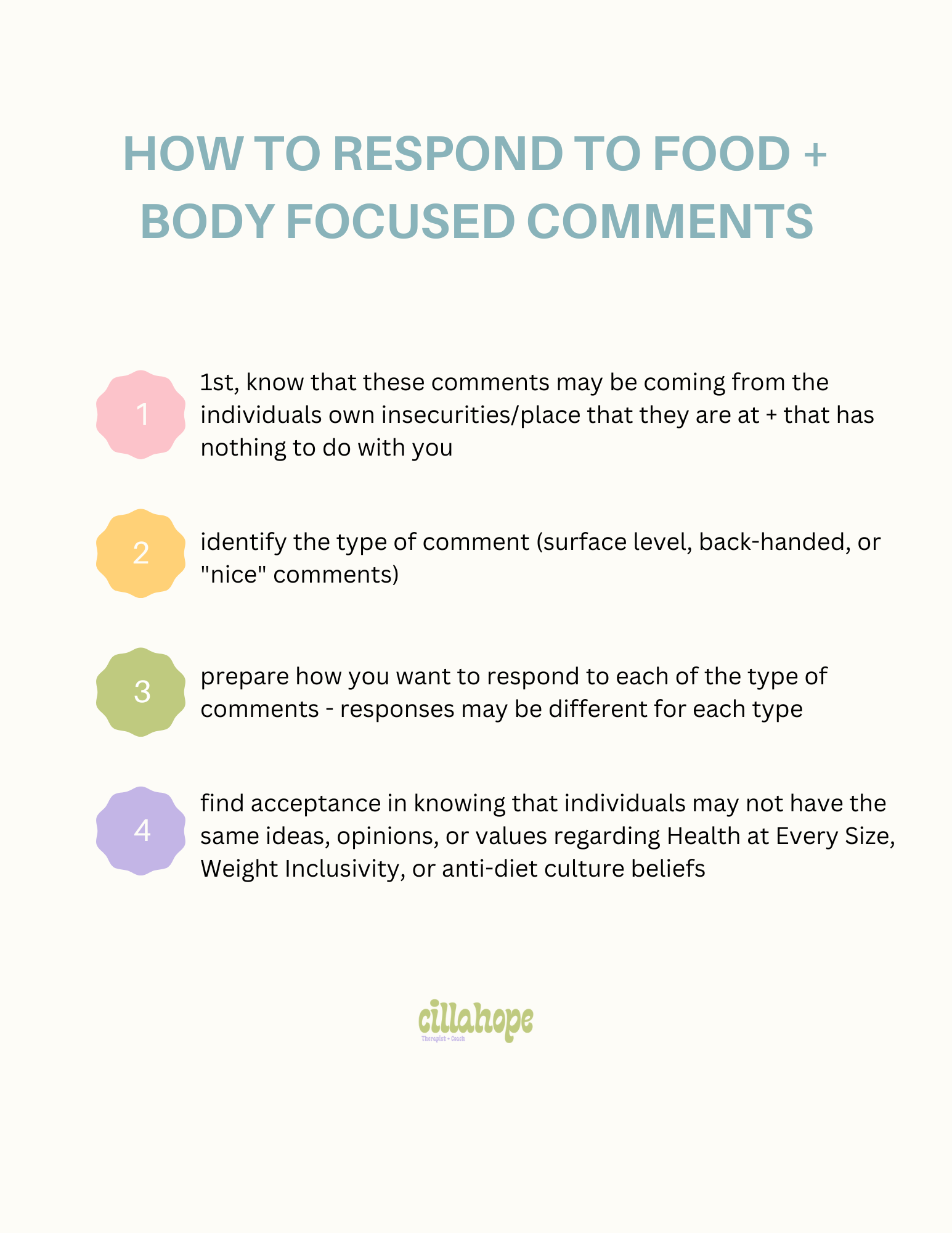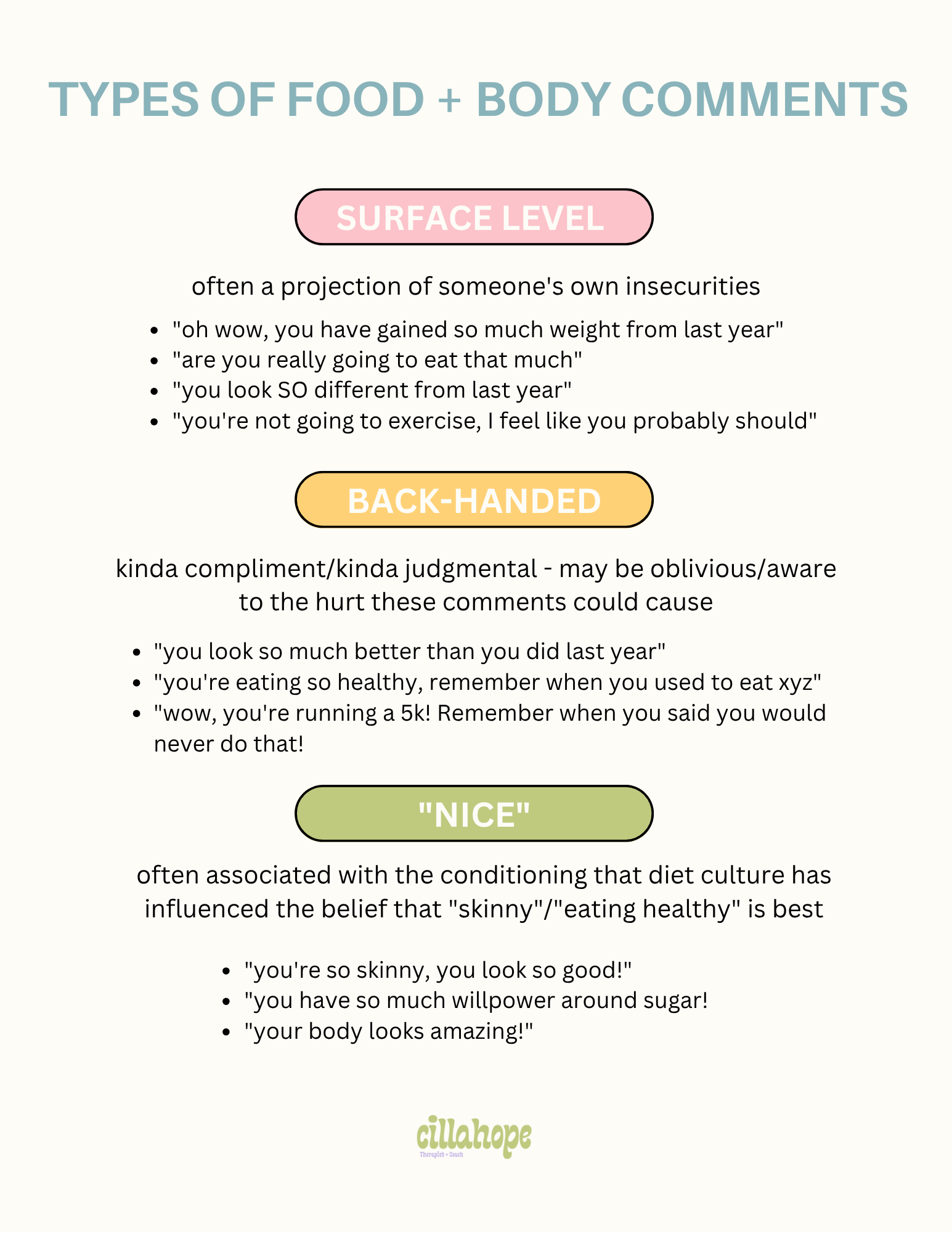Hey, i'm cilla.
Probably on the hunt for the best donut in town while listening to Noah Kahan and yapping about Taylor Swift.
1:1 body image coaching
join the lunchbox notes (my bi-weekly newsletter)
body image fanny pack
You’re halfway through a family dinner, happily munching on your mashed potatoes, when someone (probably Aunt Karen) sighs dramatically and says, “Ugh, I’ve been so bad lately. I need to detox next week.”
Suddenly, your brain is doing cartwheels. You’re trying not to spiral, but your internal monologue sounds like a Greek chorus of anxiety, frustration, and childhood triggers.
Sound familiar?
Let’s talk about how to respond to diet talk, body shaming, or toxic “health” comments from family and friends—without it wrecking your mood or your recovery. We’ll be using tools from my Discovering Freedom workbook to guide your response. Think of this as your personal survival guide for the next dinner party.

5 Tips For What to Say When Aunt Karen Won’t Stop Talking About Her Diet
Step 1: Understand Where It’s Coming From
The workbook reminds us that most comments about food, bodies, and weight are projections of someone else’s insecurities—not a reflection of you or your worth.
You are not the emotional landfill for someone else’s diet culture baggage.
Use this mantra: “I am not responsible for the emotions of others.”
Step 2: Recognize the Type of Comment
In the workbook, I break down most commonly used comments into 3 categories:
- Surface Level:
- Back-Handed:
- “Nice”, But Rooted in Diet Culture:

I believe this is (if not) one of the most important steps because it gives you a clear direction of how much energy you want to use when responding.
Step 3: Choose Your Response Style


1. Pivot Style (aka The Classic Dodgeball):
“Oh, speaking of wild things… have you watched the new season of Love Island?”
2. Take Physical Space:
Excuse yourself. Bathroom. Walk the dog. Hug your favorite cousin. Byeeee. Gotta Blast.
3. Set a Boundary:
“I’m working on not talking about food or bodies in that way. Can we change the subject?”
4. Educate Gently:
“I’m learning to see food as neutral—not good or bad. It’s been helpful for my mental health.”
5. Offer a Correction:
“We’re not being ‘bad’ for eating dessert—we’re just… eating dessert.”
6. Call It Out (Kindly, but Boldly):
“Isn’t it bizarre that we always talk about bodies at dinner? I have way more interesting things to tell you about what’s been happening recently.”
Step 4: Use Your Coping Skills Fanny Pack
In case y’all didn’t know, my body freedom coping skills fanny pack is quite literally a tool that I use religiously throughout every single day. It’s the one thing that I always talk about first when starting your body image journey.
A few of my favorite tools in the fanny pack that can be used with body talk conversations are:
- Self-soothing: Cozy up with a blanket post-dinner, pet your dog, or make your favorite tea.
- Cognitive restructuring: Put the toxic comment on trial. What’s the evidence against it?
- Radical acceptance: “It’s raining.” AKA, you can’t stop people from saying dumb things, but you can decide not to spiral.
Step 5: Journal It Out
Later, reflect using these body image journal prompts:
- “What did that comment bring up for me?”
- “What was my ED voice trying to say in that moment?”
- “What coping skill did I use—and how did it help?”
- “What wounds do I have that still need healing?”
Want even more journal prompts for body image? You’ll love these posts next!
Summer Body Image Journaling Prompts
Body Image Journal Prompts Using Parts Work
Just because people around you are still swimming in diet culture doesn’t mean you have to dive in too. Keep building your response muscles, lean on your coping tools, and remember:
You’re allowed to protect your peace.
And if Aunt Karen gets offended? That’s a her problem.
Want to keep the healing vibes, vibing? Go ahead and download a free snippet of the body freedom workbook below!
New Here? I’m Cilla – Your New Body Image Bestie
I used to say that I was “Fully Recovered” when someone would ask, but now? I fully embrace the messy journey of what recovery does look like post intense ED treatment, re-feeding, and 3 therapy appointments/week. I’m here for the folks that have worked through the ‘food stuff’, but find the body image stuff to still linger from time-to-time. My point is, your messiness is welcome here.

July 29, 2025
How To Respond To Body Talk Without Spiraling
how i can support you
© CILLA HOPE WELLNESS LLC, 2024.
LEGAL